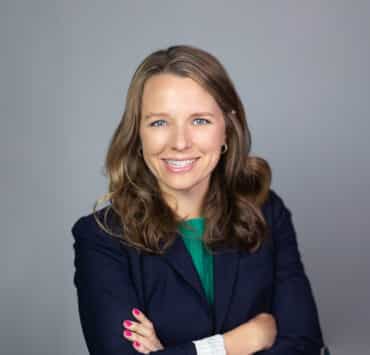|
Getting your Trinity Audio player ready...
|
Caitlin Klingenberg fell in love with mock trial at age twelve. Thrilled by rhetoric, she was also an exceptional student of the sciences, and her father and teachers encouraged her to keep developing her skills. As she prepared to begin her undergraduate studies at the University of Iowa, her father extracted a promise that she would complete an engineering major. That proved wise.
She admits that some pre-law courses were “less stimulating than anticipated.” “The engineering course work was really what I needed at the time,” she reflects. “It set me up well for a career in patent law by providing a very analytical way of approaching a problem, a way to think things through methodically.” At Drake University, she specialized in environmental and agricultural law before entering private practice in Des Moines.
Her familiarity with the sciences and her family background in agriculture eventually led her to her current role at Vermeer Corporation, where she serves as intellectual property counsel. In fact, she’s the only IP specialist on a legal team of four.
A manufacturer of industrial and agricultural equipment, Vermeer distributes products worldwide from production facilities and offices in Pella, Iowa, a town of just eleven thousand. It’s a privately held enterprise, with four generations of family shareholders, that is now in its seventy-fifth year in business. Part of Klingenberg’s role is to help guide the organization across the century mark by managing and protecting the IP portfolio.
“It’s critically important that as a profession we remember that the thing that unifies all of us is the ethical responsibility to our client.”
Caitlin Klingenberg
This is Klingenberg’s first in-house counsel role, and she appreciates the opportunity to work closely with business partners to align behind long-term goals. Vermeer’s culture of community and care has made it easy to settle in. “There is a servant leadership culture and mentality at all levels of this organization,” she says. “It’s rare to find that at a genuine level when searching for in-house counsel jobs, so to see that prioritization of community is really unique.”
In 2019, Vermeer was a client of BrownWinick, and Klingenberg was involved in associate-level IP work. Klingenberg moved late that year and her commute ballooned to over an hour, so she began exploring other opportunities closer to her new community. “There is never a good time to make a switch because we have such strong obligations to our clients,” she says. Her personal sense of loyalty made it a challenge, but she was in the right time and place to step into a brand-new role at Vermeer.
Though she started during an especially isolated, challenging time of COVID-19 pandemic, the work was exciting and demanding from day one. One key to Klingenberg’s approach at Vermeer was to think of IP as a business asset, and she honed this approach at BrownWinick.
It’s important to consider intangibles like IP in tangible terms; the realness of the asset is slippery, but the asset’s value is real. Patent applications and trade secrets are especially difficult to assess appropriately. “It’s hard to comprehend the value wrapped up in the totality of a brand, so how do we explain that in business terms, especially to a client used to dealing with steel and widgets?” she says.
Now, she practices explaining it to her non-legal colleagues as follows: “You wouldn’t let your teenager drive your car without getting insurance, without explaining the rules of the road, or without a curfew,” she says. “It’s very much the same with intellectual property: how do we use this, and what mechanisms do we put in place to protect its value?”
This in-house role has been a good fit because Vermeer’s values are close to her own, Klingenberg explains. It’s a community company, and she sees the “caring culture” in practice each day. “Nothing gives me pause about being here,” she says. “Our prioritization of people and the ways we care for each other, all of that is very much how I live my life outside of being an attorney.”
“There is a servant leadership culture and mentality at all levels of this organization. It’s rare to find that at a genuine level when searching for in-house counsel jobs, so to see that prioritization of community is really unique.”
Caitlin Klingenberg
Klingenberg reminds emerging legal professionals to value this kind of alignment: to be worthy of the role, one has to weigh more than the prestige and billable hours. “It’s critically important that as a profession we remember that the thing that unifies all of us is the ethical responsibility to our client,” she says. “If that’s what we’re after, and we’re doing that to the best of our abilities, there’s very little that anyone can say negatively about the profession.”
So, she adds, any legal professional seeking their next role should consider more than finances. Instead, they should think deeply about what type of life they want to lead, and what matters at the end of each day. “That’s what really excites me about the next generation of attorneys,” Klingenberg says. “The awareness, the self-advocacy, the ability to say: this is what matters to me. This is what’s important.”


